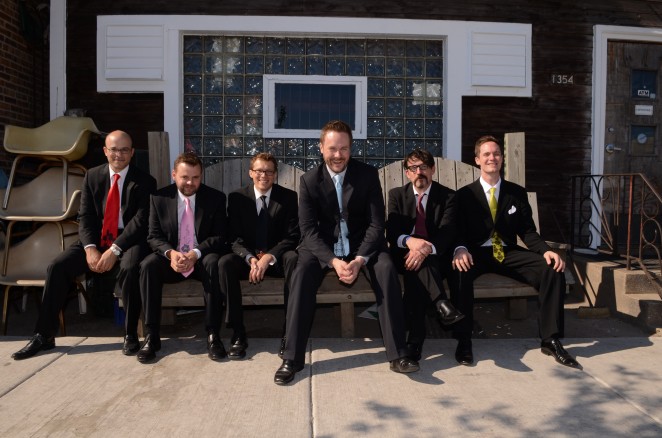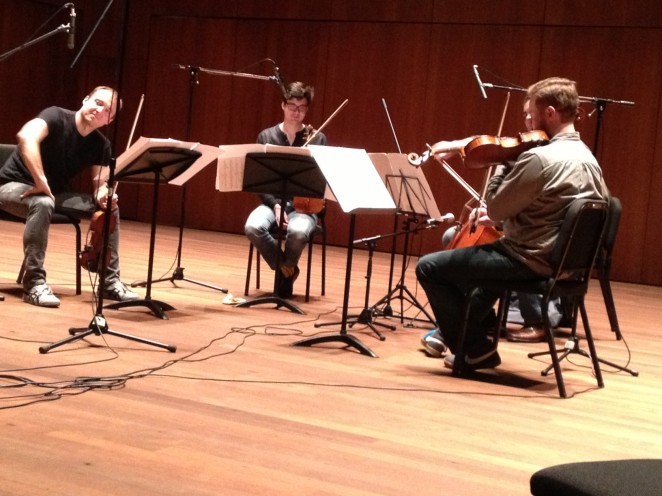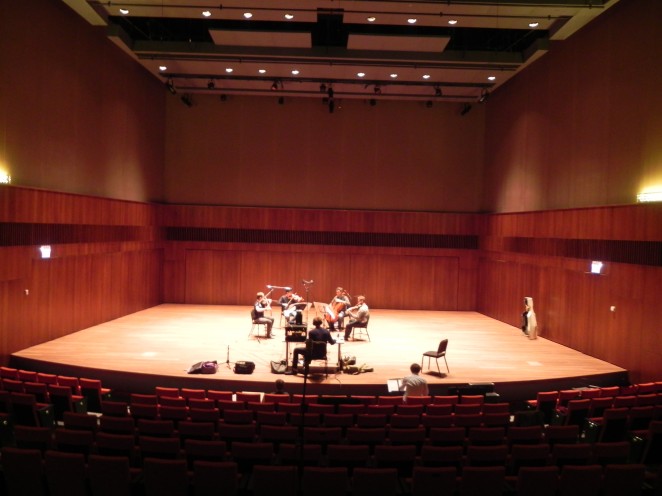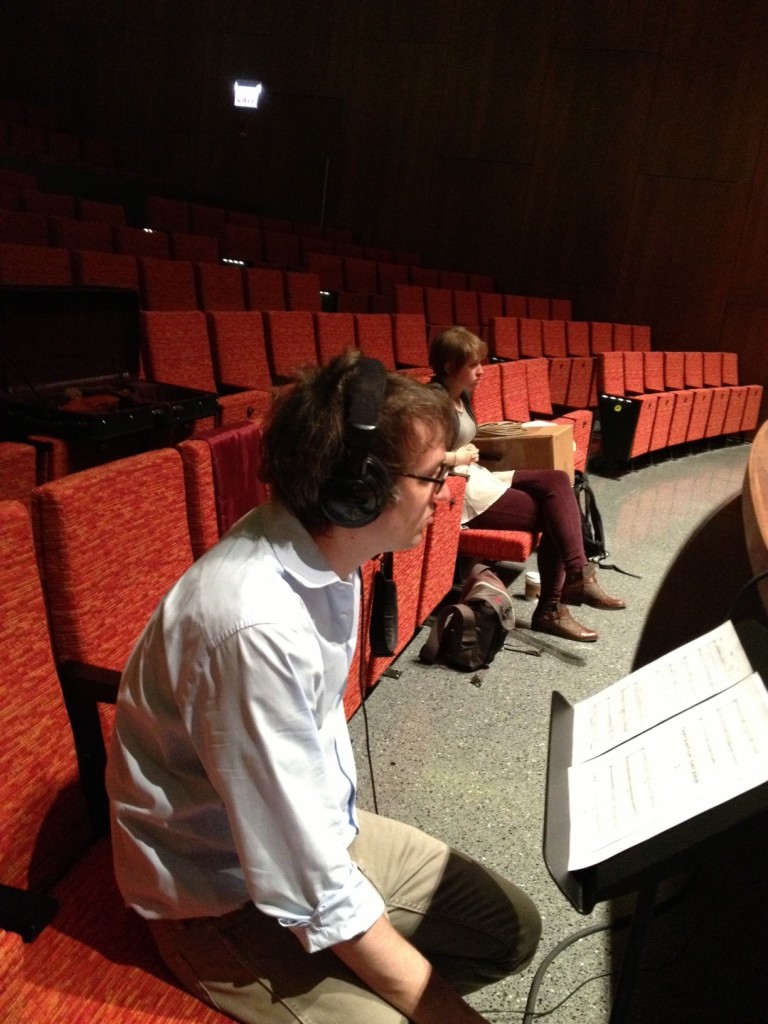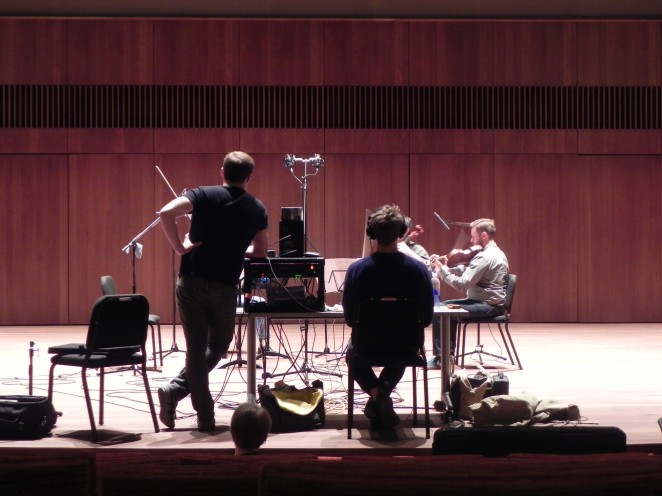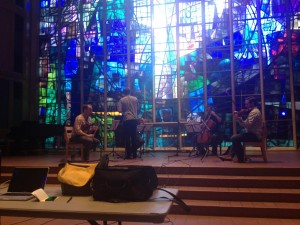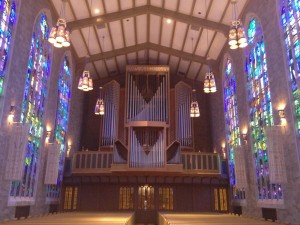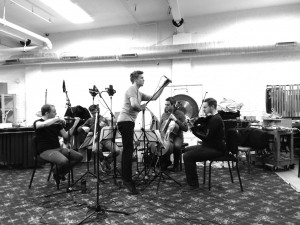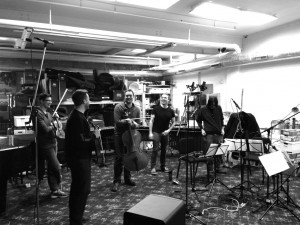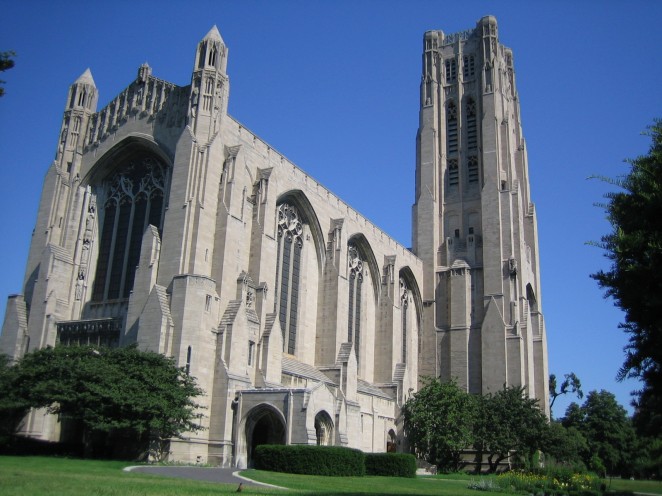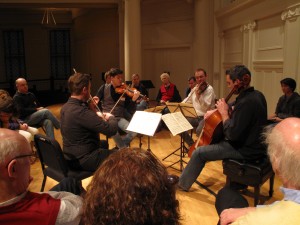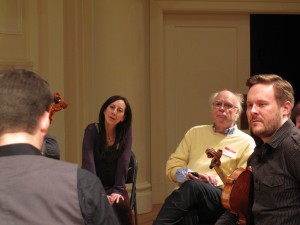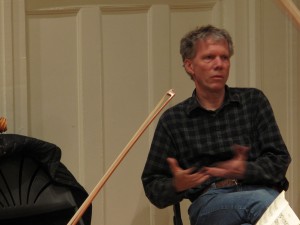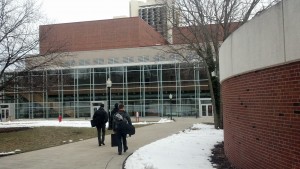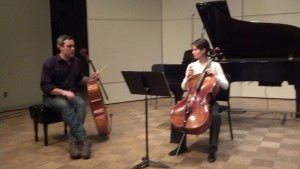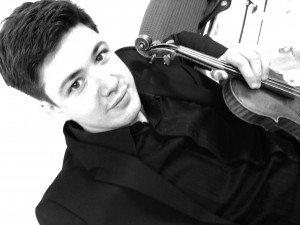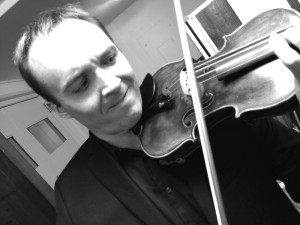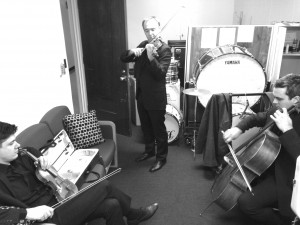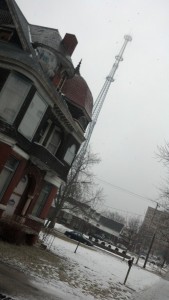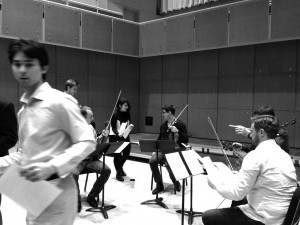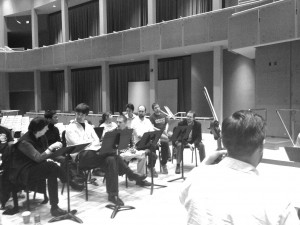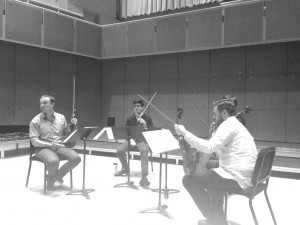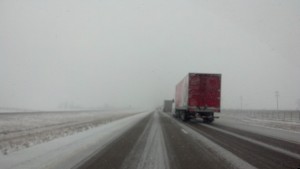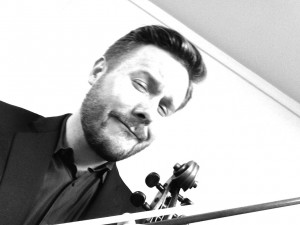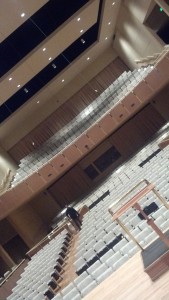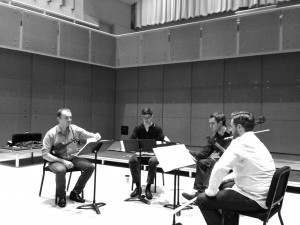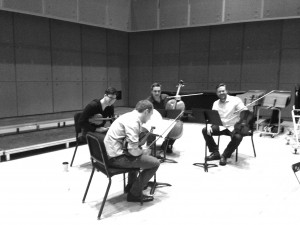Comic Cadences: Test Run - Richard Lewis
Chambers is in the Can
Hark! I bring you tidings of great joy! Spektral Quartet and Parlour Tapes+ have all six pieces on Spektral's debut album on tape!
Our final session.
I'm so excited about this record, and couldn't be prouder to have recorded such challenging, intelligent and expressive music for our first disc. Here are some things I can tell you:
-Recording Ben Hjertmann's piece on Friday and Eliza Brown's on Saturday was one of the biggest challenges this quartet has ever faced. Both pieces are incredibly difficult individually and for the ensemble, and in drastically different ways: the wild virtuosity and rapid-fire changes of Ben's piece versus the intricately interwoven web of microtonal harmony, pulsating rhythms and subtle timbres in Eliza's work.
-The record is titled "Chambers", a nod to Marcos Balter's piece on the album, the unique sound world of each piece, and that thing the four of us do every day.
-I am a danger to my instrument...after breaking my good violin during our first collaboration with Julien Labro (that video has me playing on a second-rate loaner after I ripped the top off my fiddle with a bow whip), I've proved once again "why we can't have nice things". Luckily, I was using my secondary violin to play the guitar-picking sections of Ben Hjertmann's piece in our session on Friday. Check out the sound of me knocking the bridge off my instrument with a big hit behind the bridge:
Also, things get a little loopy when we're hunkering down in the studio. Our coping mechanism seems to be extreme wackiness...thanks to Jenna Lyle for taking notes on our silliness during Friday's session:
“And THAT’s why they call him ol’ One Take Armbrust!”-Austin
“What do we want?? Time travel!! When do we want it?? That's irrelevant!!”-Aurelien
“Are there any shorter chairs? I can’t hunch over the way I like with these.” -Austin
“Bar 60 was the best we’ve ever done it that time.”-Russ
“Yeah, seriously. Speed it up, do a little pitch correction in post... It’ll be great.”-Doyle
“Why Guitar Players Have Frets: Part 800”-Austin
“Ya know, it should be more like ‘da-doo-dat-doo-dat--dat’”-Russ
“Well that was definitely tragic.”-Russ
“Ca-Kaww!”-Austin/Aurelien
“There’s the performing phase, and there’s the judging phase. And when you go too long....one takes over...How about 5. Take 5?” -Russ
Stylistic Maneuvers
I've never been the kind of musician (or music fan) who feels the need to be exclusive in my tastes. While it may surprise some of you who are more familiar with me writing about Haas or Carter, I'm just as likely to listen to Ke$ha or Chick Corea's "My Spanish Heart" without the slightest tinge of irony.
If I spend too long playing strictly concert hall music, I get a bit itchy. I'm certainly listening to other stuff, like my recent obsession from an amazing super-group.
That's why the the beginnings of our collaboration with Julien Labro for an album on Azica Records have brought me musical energy just when I thought I was burnt out from a long concert season.
First of all, Julien sent us a new arrangement of this scorcher a few months back to start work on:
Given the mixed meters and quicksilver solo lines, it's a good thing we've had some time to absorb the tune.
I'll be honest, I'd never heard of any of the artists on this track before Julien sent it our way. And, it's more of the same with a few other composers and tunes on the record. That includes the thorny hubbub of Fernando Otero's "De Ahora en Màs" and a couple tunes by the incredibly talented Diego Schissi, whose adventures in nuevo tango have a flavor of Stravinsky.
It's not like I've never listened to Latin jazz before, but diving into the styles and listening with actually playing these different moods and grooves in mind has been an adventure in uncovering some really special musical personalities.
Our first shows with the new material are on Tuesday at the Clark Street location of Uncommon Ground and on the Pittsburgh Chamber Music Society the following day. Look for more shows this fall, and the album later in the concert season!
But, it's not our first time playing together and we'll be bringing back some familiar arrangements from familiar names:
Old Man and the C: Live at the Hide-opolis
Remember our end-of-the-year party at High Concept Labs last June? What you probably didn't know is that the power went out on half of Wabansia Ave just hours before you showed up. Across the street, the folks at the Hideout were scrambling to figure out what to do with the sizable crowds queueing up for its Just For Laughs Festival (and acts like W Kamau Bell, Pete Holmes and Brody Stevens) that very same evening. The Hideout pleaded with us to use the downstairs space at HCL and I immediately envisioned the Andante movement of Beethoven's Op. 59 No. 3 with Reggie Watts's dulcet ballad, F**k S**t Stack, wafting up through the floorboards. Short story long, we offered to help them out (don't worry, the power came back on prior to show time) and Hideout owner Tim Tuten offered us a slot in his 2013 season lineup…which we are cashing in on this Saturday.
Personally, I couldn't be more excited to play this joint. The Hideout is intimate, the stage is low and inviting, the crowd open-eared and the drinks silly cheap. If there is any question how much I love this venue, might I direct you to one of the photo locations from my wedding in 2011:
This house-shaped club isn't really a secret in Chicago, but sitting as it does in the middle of a public works campus, fans have made an effort to be there, and the riff raff is minimal or non-existent. It's played host to some outstanding talent, such as:
(get ready for some QUALITY audio, folks…)
Glen Hansard
Jeff Tweedy
Shellac
CAVE
The Fiery Furnaces
Jay Reatard
Alabama Shakes
Spektral can't wait to get the sounds of Alex Temple, Steve Gorbos, Ben Hjertmann, Liza White, Francisco Castillo Trigueros, Haydn, Mozart, Beethoven and Verdi inside these hallowed walls. Make sure you come up and say hi after the show…or during the show for that matter. See you on Saturday!
Scrapbook of a Recording Session
This past Tuesday morning, we made the trek down Lakeshore drive to the Performance Hall in the Logan Center at U. Chicago. Our friends from Parlour Tapes+ were already mostly finished in their setup as we warmed up and got situated. We came into this session feeling confident about our preparation and eager to get Hans Thomalla's "Albumblatt" on tape. It may be the piece we've played the most over our first three seasons as a quartet.
Adjusting to the incredibly clear acoustic of the hall took some time, but once we started playing full takes of the piece we began getting in a rhythm. Once the initial concern about getting it perfect wore away, it came down to playing the piece the way we know how...microphones be damned.
Having Hans' exacting ears there for the session was a boon, helping tweak our dynamics and articulations for the room and the microphones.
As the session wore on and it came down to making sure we were happy with everything, we realized we were better off having a coffee than continuing the session. We're looking forward to refining the sound of the recording the same way we've tweaked our conception of the piece over the last year.
Introducing Parlour Tapes+
A first foray into any realm of great importance is best made with friends. So, as we programmed our debut album it was self-evident that we record works by our composing comrades here in Chicago. And when we were approached by our pals Jenna Lyle and Kyle Vegter (who have teamed up with more amazing people in Andrew Tham and Ellen McSweeney) to be part of launching their new record label the choice was clear: an album of Chicago composers on a Chicago label.
We're thrilled to be a part of the birth of the first Chicago label devoted entirely to contemporary art music, Parlour Tapes+. You can come see the label take its first public steps at "The Guilty Party" on May 16, an evening of music and mystery. We'll be there, helping to score the action as we unmask the "killer" of Third Coast Percussion's David Skidmore!
And the good news is, this recording is really happening! We already have Chris Fisher-Lochhead's "Dig Absolutely" in the can, and recently recorded Marcos Balter's "Chambers" in Northwestern University's reverberant and spacious Alice Millar Chapel.
Check it out.
Getting the mics set with our inimitable producer Kyle Vegter:
In case you were wondering, this place is pretty majestic. We had mics getting room sound up there...
Doyle preaches the good news of the viola to the congregation:
Old Man and The C: Free Hugs
Humans of Earth,
What a week. What a terrible, horrible, very bad, no good week. I prefer The Onion's take on the conclusion to the Boston manhunt:
It's times like this when I feel fortunate to be a musician; to have an artistic outlet for confusion and rage and despair and hope. I watched this tragedy unfold from a distance here in Chicago, and I don't mean to make any part of it about me (because it sure as hell isn't). I can't pretend to know what it must be like to have one's life indelibly transformed by the loss of mobility, or the death of a loved one to such an unfathomable disaster. A magnified sense of vulnerability is something we all share, though, and today I'd like to express how much I value all of you.
To my wife and my family: I love you and thank you for fostering this crazy dream of playing music for a living.
To the Spektral fans: chatting, laughing and nerding-out with you at our shows is really what makes every performance inspiring for me.
To my musician friends: thank you for making Chicago the unstoppable sonic engine that it is.
To my composer friends: thank you for making each day of rehearsal hair-pulling-ly challenging and artistically exhilarating.
We're headed back into the recording studio (two down, four to go) these next couple months, but we hope to hear from you soon. Just don't be alarmed if I hug you a little tighter when I see you next.
Stay safe everybody,
Doyle
Jacob Bancks: Approaching the Quartet
This Friday, Spektral takes to the road for a day of masterclass and performance at Augustana College in Rock Island, IL. We're very much looking forward to premiering a new work by Jacob Bancks, entitled Canticle, who I've known for several years since he was a student at the University of Chicago and I played Messiaen's Quartet for the End of Time with his wife Kara, an excellent clarinetist. Here are some thoughts from him about his personal approach to composition and the string quartet genre.
JAW: In approaching a new work for string quartet, do you find the tradition of the repertoire inspiring or encumbering? What are your favorite quartets and did you draw any inspiration from them for this work?
JB: A lot of composers talk about being weighted down by Mozart, Shostakovich, whomever, when writing string quartets. Honestly, I never let old, famous works in any genre get in my way; that would be like my three-year-old daughter getting her crayons jumbled by the specter of Picasso. And plenty of people can't tell the difference between the two anyway. There are however a few canonical string quartets that I'm constantly engaging, in this project and elsewhere. As a nerdy undergrad I went up to Performers' Music on Michigan Ave. and devoutly bought that red faux-leather volume of the complete Bartók quartets like it was the Book of Common Prayer. Every couple of years I go back to those, and my mind is newly-blown; they're like six new works each time I hear them. Of late I've also become an unwitting fan of Joseph Haydn's quartets. I tell my theory students, Haydn's like your dad: you think he's boring now, but the older you get, the more grotesquely fascinating he will become. And I always go back to Beethoven, especially Op. 130 (B-flat Major) which is personally very sentimental to me, and Op. 131 (C-sharp Minor), which I find both exhilarating and baffling. But my real string quartet fetishes of late, which might be obvious from the new work for Spektral, have been Ravel and Debussy. They each wrote only one quartet: why mess with perfection?
JAW: How did you approach putting pen to paper for this work? Did you begin with an idea of the piece as a whole or smaller moments?
JB: In this particular piece, I started with several musical images that I attempted to shape into a cohesive whole. The centerpiece of the work is this temperamental, bold, coarse cello solo, which has the other instruments responding in various stages of confusion and amazement. The rest of the piece centers on two basic ideas, both of which are transformed through the lens of the cello solo: excruciatingly slow, solemn polyphony; and uncontrollable, quietly nervous flickering.
JAW: How has life as a composer changed with your new role as a faculty member, compared to your past life as a composition student at University of Chicago?
JB: I loved UChicago, so leaving was hard. I was actually teaching for two terms before I came back to defend my dissertation, which was when it struck me that I had spent the last six years around some of the most brilliant musical minds on earth. But Augustana has been an ideal gig for so many reasons: I have excellent colleagues, I enjoy my students, my class sizes are small, and I have been able to build a composition program essentially from scratch. And I can swim to Iowa any time I want. Teaching has, without question, made me a better composer. For one, I nag my students enough about their productivity that I've started expecting more out of myself as well. And I love teaching undergraduates from all kinds of backgrounds: there's nothing like playing Firebird for someone who's never heard it before, or helping a student progress from barely reading notes to beginning to digest works of Berio and Feldman within a couple of years. More than anything, teaching keeps me constantly working toward expressing only the most worthwhile ideas with clarity, passion, and coherence, which is exactly what I hope for in my music as well.
(Re)Arranging the Seven Last Words
I began exploring Haydn's Seven Last Words of Christ by researching the history of the work's inception, revisions, and publication. Since there were many different arrangements of the work during Haydn's own lifetime (for orchestra, solo piano, string quartet, and choir), there were a lot of places one could start and a lot of resources to refer to. Since I didn't want to radically reinterpret the quartet treatment, I used the Trautwein plates of the string quartet version as a point of embarkation and began entering that score, in its entirety, into Finale. I received some assistance with this step from my friend and copyist Jeff Schweitzer.
I then cross-referenced each measure of the newly entered score against the 1801 Breitkopf und Härtel choral version: my primary source. Throughout the project, I also referred to the Bärenreiter Kassel edition of the orchestral score, and the Edition Peters and Henle urtext editions of the string quartet. And, just in case I needed a second (or third or fourth) opinion, I made a Spotify playlist of every version of the piece I could find.
One of the reasons I love arranging is that each project is different and requires different ways of assessing musical problems and thinking both creatively and practically. Sometimes, the principle challenge of a project will come from adapting an idea for a large ensemble to a smaller instrumentation (or vice versa). Other times, a challenge will arise translating material from one instrumentation to one with radically different strengths and limitations. However, for this project, those kinds of broad issues were not particularly applicable since I was adapting a work for string quartet for, well, string quartet.
Instead, the challenges that I encountered were making changes that would fix tuning, balance, voice leading, textural consistency, contrapuntal clarity, etc. while being subtle, stylistically appropriate, and always respectful of what Haydn, a master of the string quartet, put on the page. I was extremely fortunate that the Spektral Quartet prepared a list of passages in the work that were especially thorny and I was surprised when I found some considerable inconsistencies between the string quartet and choral versions: sections originally marked fortissimo marked pianissimo, missing melodies in the winds, omitted chord tones from the tenor line, etc.
I sent finished drafts of each movement to Dr. Cliff Colnot, who would edit my work. It was Dr. Colnot who introduced the quartet and me, and I have been very fortunate to work with and learn from him on many projects. After implementing those changes, I sent the score to the quartet, who then played through the work and offered thoughtful suggestions, which resulted in the final version of the score.
Arranging "The Seven Last Words of Christ" required focus and fastidiousness, but the process was very meditative. I found myself suddenly recalling memories of observing Lent as a child: attending "The Stations of the Cross" devotions, traveling to different churches on Holy (Maundy) Thursday, and fish on Fridays. Regardless of one's faith, there is a beauty in remembering dying and their last moments. I am very thankful for the opportunity to work on this project with the Spektral Quartet and I look forward to our next collaboration.
Recording Dig Absolutely
Here we are in the studio, folks. Our first album is happening: a bevy of new works by Chicago composers. First stop, Chris Fisher-Lochhead's "Dig Absolutely". In a couple weeks, we'll be back under the mic for music by Marcos Balter and Hans Thomalla. More to come...clicking embiggens these pics.
Producer Kyle Vegter.
Getting at the finer points of CFL's difficult-to-perfect double-stop harmonics.
Last Words?
a guest post by Elizabeth Davenport, Dean of Rockefeller Chapel
The first time I heard Spektral Quartet play I thought, “It would be out of this world to get these guys to come and play at Rockefeller Chapel.” And now it’s happening! Seven days from now, to be precise: March 28, 2013. They’re going to play Haydn’s Seven Last Words of Christ in the context of a dramatic liturgical moment of the year – the Tenebrae of the night before Good Friday, a night when we strip the Chapel bare of all the extras, candles and fabrics and silver.
Rockefeller Chapel is a vast space. The word “chapel” conjures up an intimate space, but it really means a private space – like the chapel of a stately home, or of a hospital, or of an airport… or, in this case, of a university. Rockefeller Chapel is the spiritual and ceremonial center of the University of Chicago, where the Spektral Quartet is ensemble in residence.
Rockefeller Chapel is a place where we engage in art and performance on a large scale, matching its eighty-foot high arches and resonant stone with grandeur of sound and beauty of image and word. It’s a place where we speak to the nobility of our human quest for meaning and our great capacity for awe, as generations before us intended for us to do. It’s a place where people of many different traditions find a spiritual home. Designed after the shape of a great medieval cathedral, it’s used today in ways which mirror the world’s changing patterns of human religious encounter. But, as it was at the beginning, it’s still a place where the liturgical seasons of the Christian year are observed, along with its many other uses.
And so we gather for the solemn ceremonies of Holy Thursday – a short, stark, bare celebration at the altar, with bread and wine and hardly any music, and then the sounds of Haydn, the slow movements of the Seven Last Words, ringing through the gradually darkening building in the première of a new Spektral arrangement prepared by their friend and collaborator Joe Clark. And with it, the last words of Christ as recorded in sacred text, juxtaposed with poetry. We use poetry often at the Chapel, finding in its art a means of touching truths of new kinds (in an era where once unquestioned beliefs no longer make sense to many). On this night, we will use poetry written at or after the unthinkable death of one too young to die – a mother mourning the death of her son, which is after all part of the time-honored script of the crucifixion.
Last words. One poem for each “word,” and the closing heart-rending words of Psalm 22 (“my God, my God, why have you forsaken me?”). The terrible knock at the door in the early hours of the morning… the police officer standing there and saying, “I’m sorry.” And then il terremoto, the earthquake, the fast, furious presto, the sudden, sharp end.
It’s an experiment, like much of what we do. We haven’t done Holy Thursday quite like this before, and Haydn’s cherished work hasn’t been played quite like this before. But in this space, and on this night, the script is rewritten. Rewritten for today, for now, for the mothers who have lost their sons and daughters, for the young caught up in the violence that tears us apart, now as then.
We read and we listen – and perhaps we gain some new insight into the old, old story, and for sure we hear afresh Haydn’s achingly beautiful writing. And we mourn for the lives lost, for the tragedy of it all. And yet, even in despair, we find some fragment of hope – some chord that lifts us out of our reverie, some new thing, some sense (as is the promise of Easter) that there is more to come.
If you’re anywhere near Chicago on March 28, I hope you’ll be there (7 pm at Rockefeller Chapel at Woodlawn and 59th). And if you’re not anywhere near Chicago, please make your travel arrangements now. You should not miss the Spektral Quartet offering their magnificent artistry in this most wondrous of spaces on this most solemn of nights… with their very own re-imagining of this beloved music.
A Very Open Conversation
Last Thursday, we pulled Verdi's String Quartet out of the pile of quartet parts in our respective studios and rehearsed it for the first time in over two months. But, this was no normal quartet session hidden away in one of our living rooms, we intended to do work on the slow movement in front of a small audience. Our goal was to get them immersed in our process, and have them learn about the way we do work.
We had first tried this concept at the Scrag Mountain Music Festival in December and were eager to try some of its possibilities out in the Music Institute of Chicago's lovely Nichols Concert Hall in Evanston. So, we decided it would be great to have our inquisitive board member Natalie Bontumasi on hand as the non-performer moderator. We also invited the inimitable Hans Jensen to provide his deep brand of thinking into the musical ideas and string playing issues at hand. Both are pictured here:
Mathias Tacke, a former member the venerable Vermeer Quartet, was also on hand providing thoughtful and provocative comments:
While we learned from what our mentors had to offer, we also picked up new thoughts from our audience's insights and questions as well.
We even got in a few laughs.
We'll definitely be doing this again, in many subtly different forms, in the hopes that exposing the inner workings of what we do can provide new sources of inspiration for both the audience and ourselves.
Being Weird in Normal
As we exited the Chicago suburbs, and the corporate jungle evaporated, I found myself excited by all the shockingly open space in Illinois. We were on our way to Bloomington/Normal for an appearance on the Red Note Music Festival at Illinois State University. During our time there, the students were highly receptive and energetic at our master class and composer readings, not to mention the engaged and interested audience for our evening concert of works by Carter, Balter, Fisher-Lochhead, Dehaan and Thomalla.
Sometimes you're acutely aware you're arriving somewhere much different than home:
Our Monday arrival at ISU and Russ in action coaching Ligeti's solo sonata:
Backstage before Monday evening's concert, things sometimes get a bit punchy:
A view of downtown Bloomington from my Tuesday morning run:
Tuesday afternoon's composer readings included feedback from the venerable Joan Tower in the lovely concert hall at ISU.
Winter storms could not stop us from a swift return to the windy city:
Being Weird in Normal
As we exited the Chicago suburbs, and the corporate jungle evaporated, I found myself excited by all the shockingly open space in Illinois. We were on our way to Bloomington/Normal for an appearance on the Red Note Music Festival at Illinois State University. During our time there, the students were highly receptive and energetic at our master class and composer readings, not to mention the engaged and interested audience for our evening concert of works by Carter, Balter, Fisher-Lochhead, Dehaan and Thomalla.
Sometimes you're acutely aware you're arriving somewhere much different than home:
Our Monday arrival at ISU and Russ in action coaching Ligeti's solo sonata:
Backstage before Monday evening's concert, things sometimes get a bit punchy:
A view of downtown Bloomington from my Tuesday morning run:
Tuesday afternoon's composer readings included feedback from the venerable Joan Tower in the lovely concert hall at ISU.
Winter storms could not stop us from a swift return to the windy city:


